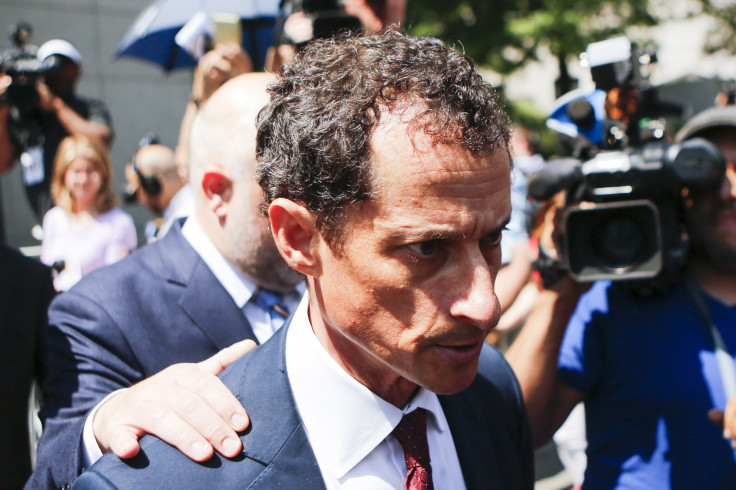Anthony Weiner Sexting Scandal: Teen's Motive Was To Influence Election, Lawyers Claim

Months after disgraced former New York congressman Anthony Weiner pleaded guilty to sending sexually explicit messages to a North Carolina teenage girl, his lawyers told a judge Wednesday that he should not be imprisoned when he will be sentenced on Sept. 25, reports said.
The lawyers, who filed submission in Manhattan federal court, said in those filings that the high-school girl contacted Weiner with a motive to sell her story to a publisher later. She also told investigators that she wanted to influence last year's presidential election, reports said. Weiner's wife, Huma Abedin was a close associate of Hillary Clinton who was running against President Donald Trump at that time.
The high-school girl first contacted Weiner Jan. 23, 2016, saying that she was a "huge fan," according to the filings submitted Wednesday. The high school girl was only referred to as Jane Doe (JD), in the filings.
"Unbeknownst to Anthony, JD was looking for material for a book — one she has now written and is shopping to publishers," the filings said, Bloomberg reported.
The submissions called Weiner's actions "operatic self-destruction" which was "born of deep sickness." Lawyers tried to defend Weiner's actions by saying he never tried to contact teenagers on the Internet and also didn't engage in other predatory behavior, which is usually typical of those arrested in similar cases, according to the Chicago Tribune.
"He responded to the victim's request for sexually explicit messages not because she was a teenager but in spite of it," the lawyers said. "He responded as a weak man, at the bottom of a self-destructive spiral, and with an addict's self-serving delusion that the communications were all just internet fantasy."
Earlier on Wednesday, Weiner and his estranged wife appeared before a New York City judge to ask for privacy in their divorce case.
The couple wants to keep their divorce proceedings under wraps and have their case designated Anonymous v. Anonymous. This is likely to make the case more difficult to track.
"Because there is a child involved we'd like to keep these proceedings secret to the extent your honor will allow," Abedin's attorney Amy Donehower said, the New York Daily News reported.
Manhattan Supreme Court Justice Michael Katz said: "I appreciate the parties' request to keep this quiet as possible. As a practical matter, despite your attempt keep this anonymous, it does not appear to be anonymous."
After having a meeting with the couple's attorneys, Katz said that he was happy to know that Weiner and Abedin want to resolve their divorce case amicably. He further added that he would rule on their desire to keep it anonymous at a later date.
"I certainly would encourage you to try to work out a plan together with your attorneys' assistance. It certainly would be better for your son if you could do that. It certainly would save you a lot of stress," the New York Daily News reported.
The divorce was filed by Abedin on the same day Weiner pleaded guilty in court. Weiner's controversial sexting case played a critical role in the presidential election.
Days before election day, the FBI discovered new communications from a computer used jointly by Abedin and Weiner, reports said citing U.S. law enforcement officials. Investigators found those emails when they were probing into whether Weiner violated federal law by exchanging sexually explicit texts with the teenage girl, an official said.
© Copyright IBTimes 2024. All rights reserved.





















